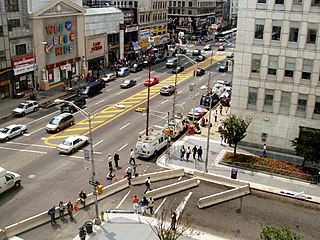Journalism is the production and distribution of reports on current or past events. The word journalism applies to the occupation, as well as citizen journalists who gather and publish information. Journalistic media include print, television, radio, Internet, and, in the past, newsreels.
Media bias is the bias or perceived bias of journalists and news producers within the mass media in the selection of many events and stories that are reported and how they are covered. The term "media bias" implies a pervasive or widespread bias contravening the standards of journalism, rather than the perspective of an individual journalist or article. The direction and degree of media bias in various countries is widely disputed.

The news media or news industry are forms of mass media that focus on delivering news to the general public or a target public. These include print media, broadcast news, and more recently the Internet.
Sports journalism is a form of writing that reports on matters pertaining to sporting topics and competitions. Sports Journalism started in the early 1800s when it was targeted to the social elite and has transitioned into an integral part of the news business with newspapers having dedicated sports sections. The increased popularity of sports amongst the middle and lower class led to the more coverage of sports content in publications. The appetite for sports resulted in sports only publications like ESPN and Sports Illustrated. There are many different forms of sports journalism, ranging from play by play and game recaps to analysis and investigative journalism on important developments in the sport. Technology and the internet age has massively changed the sports journalism space as it is struggling with the same problems that the broader category of print journalism is struggling with, mainly not being able to cover costs due to falling subscriptions. New forms of internet blogging and tweeting in the current millennium have pushed the boundaries of sports journalism.
Journalistic ethics and standards comprise principles of ethics and good practice applicable to journalists. This subset of media ethics is known as journalism's professional "code of ethics" and the "canons of journalism". The basic codes and canons commonly appear in statements by professional journalism associations and individual print, broadcast, and online news organizations.
The media in Africa is expanding rapidly due to advances in telecommunications, especially mobile phones and the internet. In newspaper reporting, many Africans have won international media awards. In writing both prose and poetry, many awards have also been won by Africans, and Africa now claims a Nobel Laureate in Literature, Prof. Wole Soyinka of Nigeria.

Inter Press Service (IPS) is a global news agency headquartered in Rome, Italy. Its main focus is news and analysis about social, political, civil, and economic subjects as it relates to the Global South, civil society and globalization.
Digital journalism, also known as online journalism, is a contemporary form of journalism where editorial content is distributed via the Internet, as opposed to publishing via print or broadcast. What constitutes digital journalism is debated by scholars; however, the primary product of journalism, which is news and features on current affairs, is presented solely or in combination as text, audio, video, or some interactive forms like newsgames, and disseminated through digital media technology.

Media in Sierra Leone began when the first modern printing press in Africa arrived at the start of the 19th century. In the 1860s the country became a journalist hub for Africa with professional travelling to the country from across the continent. At the end of the 19th century the industry went into decline and when radio was introduced in the 1930s this became the primary communication media. Print media is not widely read in Sierra Leone, especially outside Freetown, partially due to the low levels of literacy in the country. In 2008 there were 15 daily newspapers in addition to those published weekly. Among newspaper readership young people are likely to read newspapers weekly and older people daily. The majority of newspapers are privately run and are often critical of the government.
Dele Olojede is a Nigerian journalist and former foreign editor for Newsday. He is a winner of the Pulitzer Prize for his work covering the aftermath of the Rwandan genocide. He serves on the board of EARTH University, in Costa Rica, and of The Markup, the New York-based investigative journalism organization focused on the impact of large tech platforms and their potential for human manipulation. He is the founder and host of Africa In the World, a hearts and minds festival held annually in Stellenbosch, in the Cape winelands of South Africa. He was a patron of the Etisalat Prize for Literature.
The media industry of Iraq includes print, radio, television, and online services. In fact, Iraq became the first Arab country to broadcast from a TV station, in 1954. As of 2005 about 80 radio stations and 25 television stations were broadcasting to Iraq in Arabic, Kurdish, Turkmen, and Neo-Aramaic.

News is information about current events. This may be provided through many different media: word of mouth, printing, postal systems, broadcasting, electronic communication, or through the testimony of observers and witnesses to events.
Churnalism is a pejorative term for a form of journalism in which press releases, stories provided by news agencies, and other forms of pre-packaged material, instead of reported news, are used to create articles in newspapers and other news media. Its purpose is to reduce cost by reducing original news-gathering and checking sources, to counter revenue lost with the rise of Internet news and decline in advertising; there was a particularly steep fall from late 2015. The origin of the word has been credited to BBC journalist Waseem Zakir.
Tell Magazine is a weekly magazine published in Nigeria. In 2007, BBC News described it as "one of Nigeria's most respected business magazines".
Newspapers published in Nigeria have a strong tradition of the principle of "publish and be damned" that dates back to the colonial era when founding fathers of the Nigerian press such as Nnamdi Azikiwe, Ernest Ikoli, Obafemi Awolowo and Lateef Jakande used their papers to fight for independence.
The News Agency of Nigeria (NAN) is a news reporting agency owned and run by the Federal Government of Nigeria just like Nigerian Television Authority. NAN was formed in part to disseminate news easily across the country and to the international community and also as a means to counter negative stories about Nigeria.
Racial biases are a form of implicit bias, which refers to the attitudes or stereotypes that affect an individual's understanding, actions, and decisions in an unconscious manner. These biases, which encompass unfavorable assessments, are often activated involuntarily and without the awareness or intentional control of the individual. Residing deep in the subconscious, these biases are different from known biases that individuals may choose to conceal for the purposes of social and/or political correctness. Police officers come from all walks of life and they too have implicit bias, regardless of their ethnicity. Racial bias in criminal news reporting in the United States is a manifestation of this bias.
Brown envelope journalism (BEJ) is a practice whereby monetary inducement is given to journalists to make them write a positive story or kill a negative story. The name is derived from cash inducements hidden in brown envelopes and given to journalists during press briefings.
Ruona J. Meyer (1982), formerly called Ruona Agbroko and Ruona Agbroko-Meyer is a Nigerian investigative journalist. She was named Investigative Journalist of 2013 in Nigeria. Her work has been featured on the BBC, 234Next, Financial Times, Reuters, Daily Trust, This Day, and others. She is the first Nigerian journalist to be nominated for an International Emmy Award.




